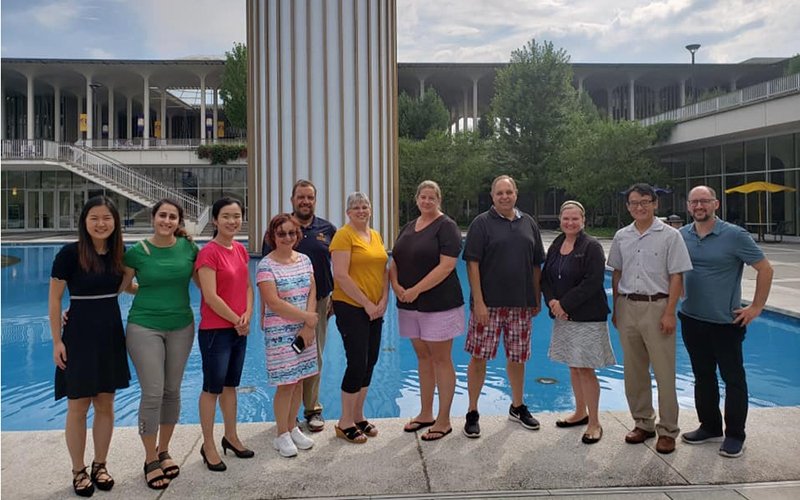ETAP Students Create Mini-Courses to Empower 21st Century Educators

ALBANY, N.Y. (Feb. 8, 2022) — Over the past 15 years, Jianwei Zhang of Educational Theory & Practice (ETAP) has worked with more than 600 graduate students on an open-knowledge network that advances productive learning in the 21st century. Called KNILT — Knowledge Network for Innovations in Learning and Teaching — it is no secret among leading educational agencies in America.

The students apply the knowledge of learning design they’ve acquired in Zhang’s online classes in Curriculum Development and Instructional Technology (MS CDIT) to create mini-courses that become resources for teacher learning. Such innovative practices of authentic learning are prime examples of why the School of Education (SOE) remains in the top 10 in the nation for online education the past six years, as announced last week by U.S. News & World Report.
Agencies that have endorsed and recommended KNILT mini-courses include the U.S. Department of Health & Human Services, National Dropout Prevention Center, Ohio Department of Education, American Mathematical Society, New York State Reading Association (NYSRA) and Colorado Department of Education. During the past two years of pandemic, the KNILT site has been used by a half million users from 223 countries, including many developing nations that lack educational resources.
Barbara Vokatis, associate professor of elementary education and reading at SUNY Oneonta, has used the mini-courses to train her own literacy graduate students and teacher members of NYSRA. “First, I am really impressed with the way these courses are structured by Dr. Zhang’s students,” said Vokatis. “They have a clear and systematic structure from which teachers can build a clear understanding, learn taught strategies and implement them right away in their daily practice.”
Vokatis also praised “the wide range of subjects that these courses cover,” how Zhang and his students were able to quickly create courses to satisfy an “urgent need for resources” during the worst of the pandemic, and how many KNILT courses are designed to improve STEM learning and literacy and language skills.
Students working with Zhang and his co-instructors Deborah Byrne and Jane Wilde have come from the CDIT MS and other SOE programs. “They carry diverse expertise as Pre-K-12 teachers, college instructors, instructional technologists and designers, health educators and other professionals,” he said.
“Each year, I am impressed by the creative work of our students: their deep engagement, thoughtfulness in instructional design, and professional collaboration. They learn from each other and offer constructive feedback. They use the mini-courses created by the prior cohort groups as a resource to support their learning and design, while expecting that future students will also benefit from their work.”

Kevin Hittle, a digital learning designer in the Office of Curriculum, Assessment and Teaching Transformation at University at Buffalo, built his mini-course as a CDIT master’s student in Fall 2020. “The lessons learned from the course carry forward daily,” he said. “For example, as an instructional designer, I now consider the situational factors of every course I design as well as anticipate how the learners will interact with the content and technology.”

Emily Duong, a 7th grade ICT math teacher in Brooklyn, created her mini-course this past fall (she graduated in December) on the topic of a mathematical model for middle school teachers. It met her aims to “create relevant resources for myself and my own professional community,” she said.
“Something that I struggled with was managing time on different parts of the project,” Duong noted. “However, thanks to the feedback from Dr. Zhang and my peers, I was able to get back on track and perfect the project.”
“I’m very glad to see how our students learn and grow through this project-based learning experience,” said Zhang. “It’s even more rewarding to see the broad use and adoption of the KNILT mini-courses by educators from around the world. Many of them write to me about their use of the KNILT and their ideas about collaboration.
“The success achieved so far reconfirms my dream that drives this project: to grow an open network of knowledge that empowers 21st century educators, who play a critical role in shaping the future of education and our world.”




